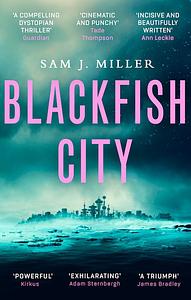Take a photo of a barcode or cover
adventurous
dark
mysterious
reflective
tense
medium-paced
Plot or Character Driven:
Character
Strong character development:
Yes
Loveable characters:
Complicated
Diverse cast of characters:
Yes
Flaws of characters a main focus:
Complicated
Really excellent worldbuilding. The plot loses steam/becomes a little bit convoluted after about halfway through, but it mostly resolves in the end. Regardless, the dystopian world was extremely rich, and I appreciated the diversity of identities represented (including a non-binary POV character, which was maybe the first time I've read a piece of fiction that consistently uses they/them pronouns). I enjoyed reading it!
Not sure how I feel about this. There were so many interesting themes thrown together that it felt too underdeveloped, despite being a creative and unique story
Ahoy there mateys! This is a beautifully written sci-fi novel with some extremely incredible world-building. In this version of our possible future, the world has flooded, the major world players have been destroyed, and humanity is clinging to existence in scattered parts of the world.
One of these locations is Qaanaaq, a floating city of a million people on the Arctic Circle. It reminds me of an oil rig city, has eight Arms, and is set up on a geothermal vent. All previous nationalities and religions are represented here though the citizens don’t really rehash the past. Pure survival is the primary goal. The technology is powerful with things like electronics stored in the jaw that have translation capabilities and an internet-like connection. At the same time, space is at a premium and money still reigns supreme. There is extreme, heartbreaking poverty and also small pockets of wealth controlled by anonymous shareholders. The government is an AI program with a few token humans holding public office. There are practically no laws. Illicit business is everywhere and the landlords have the true power.
This city has three odd things that feature into the story. The first is a disease called “the breaks.” It is usually sexually transmitted but can be passed through other bodily fluids via sickness or filth. This disease has no cure and can affect folks of any type. It causes mental breakdown and hallucinations and eventually death. The second is that the city is home to a broadcast called “City Without a Map.” The broadcast seems to be targeted towards incoming immigrants and shares explanations for how the city functions and stories of how its citizen live. No one knows who is in charge of these broadcasts. The third is that a woman just arrived in town, riding an orca, with a polar bear at her side. Who is she and what does she want?
Ye discover the answer to this question and many others through the eyes of four points of view. There is Fill, a rich, gay man who has discovered he has the breaks. There is Ankit, a young woman who works as an assistant for one of the human managers of an Arm and just wants her mother to be released from an involuntary stay in a mental hospital. There is Kaev, a mind-addled 33 year old man whose slight happiness comes from participating in fights for a living; sadly ones that he is paid to lose. And then there is me favourite, Soq. Soq is a non-binary slideway messenger. But Soq has bigger plans that involve them getting into organized crime first.
Their stories are told in third-person and the relationship of these four takes a while to branch out into interactions with other people. But these viewpoints, the broadcasts, and the information of other secondary characters in the city, make for both a complex, sprawling city and plot. And yet the information is delivered in such a fashion that yer understanding of the city and its inner workings is not hard to understand.
The main problem I had with this book was that while I liked all four points of view, I wasn’t majorly connected to or rooting for any in particular. Even if I loved Soq. And as the story grew and the paths of the characters intertwined, I really felt outside of the action. I don’t think this was a bad thing per se. But I was certainly an outsider looking in. And the buildup and tension really only ratcheted upward in the end in a fashion both startling and kinda abrupt. And yet somehow overall satisfying as odd as it was.
While I would have loved to have felt more drawn to the character struggles and less like I was viewing everything through an extremely powerful and detailed microscope, I am very happy I picked up this title. It was certainly a very different read and this review cannot really even get into the intricacies of it all due to plot spoilers. But suffice to say that I will be reading more of this author’s work in the future. Arrr!
Check out me other reviews at https://thecaptainsquartersblog.wordpress.com/
One of these locations is Qaanaaq, a floating city of a million people on the Arctic Circle. It reminds me of an oil rig city, has eight Arms, and is set up on a geothermal vent. All previous nationalities and religions are represented here though the citizens don’t really rehash the past. Pure survival is the primary goal. The technology is powerful with things like electronics stored in the jaw that have translation capabilities and an internet-like connection. At the same time, space is at a premium and money still reigns supreme. There is extreme, heartbreaking poverty and also small pockets of wealth controlled by anonymous shareholders. The government is an AI program with a few token humans holding public office. There are practically no laws. Illicit business is everywhere and the landlords have the true power.
This city has three odd things that feature into the story. The first is a disease called “the breaks.” It is usually sexually transmitted but can be passed through other bodily fluids via sickness or filth. This disease has no cure and can affect folks of any type. It causes mental breakdown and hallucinations and eventually death. The second is that the city is home to a broadcast called “City Without a Map.” The broadcast seems to be targeted towards incoming immigrants and shares explanations for how the city functions and stories of how its citizen live. No one knows who is in charge of these broadcasts. The third is that a woman just arrived in town, riding an orca, with a polar bear at her side. Who is she and what does she want?
Ye discover the answer to this question and many others through the eyes of four points of view. There is Fill, a rich, gay man who has discovered he has the breaks. There is Ankit, a young woman who works as an assistant for one of the human managers of an Arm and just wants her mother to be released from an involuntary stay in a mental hospital. There is Kaev, a mind-addled 33 year old man whose slight happiness comes from participating in fights for a living; sadly ones that he is paid to lose. And then there is me favourite, Soq. Soq is a non-binary slideway messenger. But Soq has bigger plans that involve them getting into organized crime first.
Their stories are told in third-person and the relationship of these four takes a while to branch out into interactions with other people. But these viewpoints, the broadcasts, and the information of other secondary characters in the city, make for both a complex, sprawling city and plot. And yet the information is delivered in such a fashion that yer understanding of the city and its inner workings is not hard to understand.
The main problem I had with this book was that while I liked all four points of view, I wasn’t majorly connected to or rooting for any in particular. Even if I loved Soq. And as the story grew and the paths of the characters intertwined, I really felt outside of the action. I don’t think this was a bad thing per se. But I was certainly an outsider looking in. And the buildup and tension really only ratcheted upward in the end in a fashion both startling and kinda abrupt. And yet somehow overall satisfying as odd as it was.
While I would have loved to have felt more drawn to the character struggles and less like I was viewing everything through an extremely powerful and detailed microscope, I am very happy I picked up this title. It was certainly a very different read and this review cannot really even get into the intricacies of it all due to plot spoilers. But suffice to say that I will be reading more of this author’s work in the future. Arrr!
Check out me other reviews at https://thecaptainsquartersblog.wordpress.com/
Taut, tense and wonderfully queer, this is a fine dystopian work, in a future floating Arctic metropolis occupied by refugees from all over a climate change and war devastated word, this gripped me like a penguin with hooks for hands and a grippy tendancy, the plot motors along drive by this mysterious incomer and her polar bear and killer whale, and you're not sure how the plot strands are going to weave together then bam! it all comes together. Definitely worth your time.
This book has been on my to-read pile for years. It seems like it should be right up my alley - arctic Greenland climate SF. And so I finally brought it camping. I didn't hate it, I just really wanted to like it more than I did. It followed a lot of characters and I only cared about half of them and ... I don't know, it was fine, it just didn't live up to my hopes.
Blackfish City is SUCH a good read. It's fascinatingly constructed with multiple interwoven POVs, one of which does not come from a single recognizable character, and with a strong interest in the power of storytelling. The titular city of Qaanaaq is wonderfully constructed, physically (floating in the Artic ocean, heated by a geothermal vent, the poorer sections ever trying to expand on a necessarily limited space) and socially (power dynamics between the rich and the poor, the anonymous shareholders and the everyday residents, the human inhabitants and the software that runs the city). And the outside world, ravaged by climate disaster, refugee crises, and bigotry, is a detailed historical backdrop. The writing is the kind of beautiful that begs to be read aloud to appreciate how the sentences feel.
This book pings a lot of my Ursula K le Guin feelings, while also feeling very original. My one gripe is a slightly rushed development of one side character toward the end.
Two of my favorite quotes are "A malignant, terminal case of patriotism" (happy Fourth!) and "Villains are oversimplifications." There are individual antagonists in the characters' lives, and not many characters you'd call incontrovertibly good people--some you'd call monsters--but the true harm is done by systems. This is a book full of vivid human beings, in which the villain is the existence of landlords.
Read if you like great writing / deep, gritty worldbuilding / social issues in your scifi. Or characters riding a killer whale.
This book pings a lot of my Ursula K le Guin feelings, while also feeling very original. My one gripe is a slightly rushed development of one side character toward the end.
Two of my favorite quotes are "A malignant, terminal case of patriotism" (happy Fourth!) and "Villains are oversimplifications." There are individual antagonists in the characters' lives, and not many characters you'd call incontrovertibly good people--some you'd call monsters--but the true harm is done by systems. This is a book full of vivid human beings, in which the villain is the existence of landlords.
Read if you like great writing / deep, gritty worldbuilding / social issues in your scifi. Or characters riding a killer whale.




